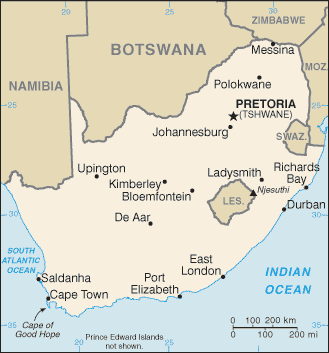South Africa

The Republic of South Africa has an estimated population of 50.5 million (UN, 2010). The capitals are Pretoria (executive capital), Cape Town (legislative capital), and Bloemfontein (Judicial capital). Johannesburg, however, is the largest city. South Africa has an area of 1.22 million sq km (470,693 sq miles). There are 11 official languages in South Africa, including English, Afrikaans, Sesotho, Setswana, Xhona, and Zulu.
South Africa has suffered from decades of apartheid. South Africa was governed by a white minority government from 1948 to 1994 against the majority of black community. According to apartheid government, the white and black communities should separated into exclusive areas based on race. The election of 1994, which brought the African National Congress to power, signified the end of apartheid rule.
In South Africa, women are well represented in the government. Women make up 30 percent of the parliamentarians, which makes South Africa one of the top countries in terms of gender equality in the government. Violence against women, such as rape and domestic violence, is highly widespread in South Africa. It is estimated that one in three South African are victims of rape, one in six South African women is a victim of domestic violence, and four women are said to be killed everyday by their intimate partners.
- South Africa has ratified the Protocol to the African Charter on Human and Peoples' Rights on the Rights of Women in Africa (The Maputo Protocol) on the 17th of December 2004.
- The Convention on the Elimination of All Forms of Discrimination against Women (CEDAW) was ratified by South Africa on the 15th of December 1995.
- South Africa has not yet adopted a National Action Plan on United Nations Security Council Resolution 1325 (UNSCR 1325).
- There are no former or current UN peacekeeping mandates in South Africa.
Source: BBC, AlertNet, CIA, UN, SIGI,
